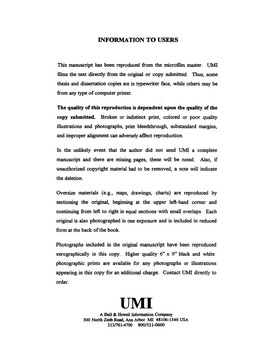| dc.contributor.advisor | Kim, Young Y., | en_US |
| dc.contributor.author | Maruyama, Masazumi. | en_US |
| dc.date.accessioned | 2013-08-16T12:30:25Z | |
| dc.date.available | 2013-08-16T12:30:25Z | |
| dc.date.issued | 1998 | en_US |
| dc.identifier.uri | https://hdl.handle.net/11244/5757 | |
| dc.description.abstract | The study was designed based on Kim's comprehensive theory, which conceptualizes intercultural adaptation in terms of interaction/communication between adapting individuals and surrounding host environment. | en_US |
| dc.description.abstract | The purpose of the present study is (a) to examine intercultural adaptation experience of international students in Japan using a theory-based research design and (b) to understand the Japanese society and people as the host environment. The previous research in the study of intercultural adaptation in Japan has largely been limited to descriptive and exploratory ones, rather than theoretical and explanatory. These studies also have neglected the importance of the host environment in the process of intercultural adaptation. Furthermore, available theoretical perspectives developed in the West have tended to lack in comprehensiveness and thus been narrow in scopes. Research based on a comprehensive theory is needed before we can fully understand the phenomenon. | en_US |
| dc.description.abstract | The results of the present study show that Kim's communication approach to cross-cultural adaptation could sufficiently and validly explain cross-cultural adaptation experience of international students in Japan. Future studies should seek for more elaborated and specialized theories that account for cross-cultural adaptation phenomenon in Japan without losing sight of general theoretical framework of the present study. | en_US |
| dc.description.abstract | The total of 171 international students in Japan served as respondents for this study. Data were both quantitatively and qualitatively analyzed. There are several interesting results in terms of "communication, " "intercultural adaptation, " and "host environment." First, the results showed that Kim's theoretical model explains cross-cultural adaptation experiences of international students. The structural equation model indicated that communication with the host nationals is a vehicle for facilitating cross-cultural adaptation. Second, while host interpersonal communication was significantly correlated to cross-cultural adaptation, descriptive and interview analyses indicated that frequencies of communication between international students and Japanese people are very limited. The interview study indicated that interaction of international students tended to occur outside of universities (e.g., at part-time jobs; volunteers; and those who are interested in their cultures). Third, infrequent interaction with host people and thus lower psychological health were largely attributable to host environment factors. The interview results showed that Japanese people favor Westerners, especially Americans, more than Asians. Westerners, however, are still treated distinctively differently as a foreigner. Interviewees frequently mentioned Japanese society and people as "closed." | en_US |
| dc.description.abstract | Fourth, there were Asian-Westerner differences in terms of cross-cultural adaptation experiences. Asians tended to be less psychologically adapted than did Westerners. Furthermore, Asians did not improve their psychological health across time, while Westerners tended to show a U-curve shape over length of residence. Participation in the host communication system explained psychological health more than did length of residence. | en_US |
| dc.format.extent | xviii, 303 leaves : | en_US |
| dc.subject | Education, Bilingual and Multicultural. | en_US |
| dc.subject | Anthropology, Cultural. | en_US |
| dc.subject | Acculturation. | en_US |
| dc.subject | Students, Foreign Japan. | en_US |
| dc.subject | Speech Communication. | en_US |
| dc.title | Cross-cultural adaptation and host environment: A study of international students in Japan. | en_US |
| dc.type | Thesis | en_US |
| dc.thesis.degree | Ph.D. | en_US |
| dc.thesis.degreeDiscipline | Department of Communication | en_US |
| dc.note | Major Professor: Young Y. Kim. | en_US |
| dc.note | Source: Dissertation Abstracts International, Volume: 59-12, Section: A, page: 4315. | en_US |
| ou.identifier | (UMI)AAI9914410 | en_US |
| ou.group | College of Arts and Sciences::Department of Communication | |
